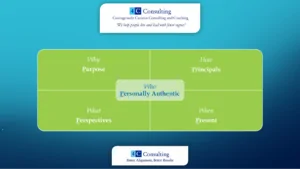Antidotes to Burnout (Part 3)
by Robert Hackman
Photograph by Getty Images on Unsplash+
This burnout, I don’t want it
Lyric from the song ‘Burnout’
By Mugsea
This is the third and final article series regarding Antidotes to Burnout.
The purpose of these articles is to answer three questions. What leads to burnout? What changes must you make to prevent exhaustion? How do Everyday Legacy Mindsets provide an antidote to burnout and put you on the pathway to living and leading with fewer regrets?
This article answers the third question.
The difference between disappointment and regret is the degree to which we contribute to adverse or unwanted outcomes.
No one wants more regrets, and yet few of us have an approach to lessening them. Adopting and integrating Everyday Legacy Mindsets help us do just that. They help us prevent burnout and guide us toward a life of fewer regrets.
Everyday Legacy Mindsets prime us to experience everyday situations meaningfully while honing our focus on what matters most. Both are crucial.
How do Everyday Legacy Mindsets infuse our lives with more meaning?
Mindsets are a collection of attitudes, practices, and habits. They filter and frame what we see, what we allow into our awareness, and what we pay attention to.
Speaker and author Stephen Shedletsky writes that when we shift our (mindset), we alter how we interact with others and the world around us, and we get different results. Additionally, speaker and author Peter Drucker states that a transformation is when nothing has changed, yet everything is different because we have changed.
Mindsets are powerful.
Everyday Legacy Mindsets heighten our awareness of how we affect others, our environment, and what we leave behind, prompting us to determine whether we generate the impact we want.
They attune us to countless opportunities to influence others and our environment positively. We become conscious that we always have a choice of how we interact in every moment. Realizing this ups our level of agency.
Everyday Legacy Mindsets prime us to notice opportunities for connection we did not perceive before. Thus, Everyday Legacy Mindsets reduce our feelings of isolation and separateness, which lowers stress.
Pleasant interactions with others and our environment improve our mood, causing our bodies to release endorphins, known as feel-good hormones.
We tend to repeat what feels good. Thus, the more we integrate Everyday Legacy Mindsets, the more we interact positively. We strengthen it until it becomes a habit.
The more connected we feel to others and our surroundings, the less fearful and the more trusting we become.
Everyday Legacy Mindsets prompt us to expand our understanding of what is possible and how meaningful various interactions can be while also becoming hyper-aware of the few things that matter most.
Humans need each other to survive because being alone leaves us vulnerable to threats without the support of others to protect us.
How Do Everyday Legacy Mindsets Sharpen Our Focus On What Matters Most?
The five Ps of Everyday Legacy Mindsets prompt us to clarify, name, and claim what we deem most significant. They help us let go of the irrelevant and pay attention to what moves us. The five Ps align our decision-making, words, and actions with what matters, opening us up, boosting our confidence, and growing our leadership.
The first of the five Ps is Purpose, your ‘why.’ Your purpose corresponds with the particular way you commit to making a difference.
Research shows that people with a defined sense of purpose have better mental and physical health, overall well-being, and cognitive functioning. They are more inclined to engage in healthier lifestyles that lower stress.
Following one’s purpose increases resilience, giving us the stamina to persevere when facing challenges. As philosopher Friedrich Nietzsche declared, (A person) with a compelling why can bear almost any how.
The second P stands for Principles, your ‘how.’ Studies show that people who think about their highest values before encountering stressful events lower their stress. Adhering to core values protects people from the most detrimental effects of stress.
The third P signifies Personal Authenticity, your ‘who.’ You affirm yourself every time you decide, speak, and act in alignment with who you genuinely are and aspire to be. Committing to authenticity helps you work in unity within yourself rather than at cross purposes. It ensures you live your life rather than someone else’s or the one you think you should live.
The fourth P is Present, your ‘when.’ Your mind is rarely in the present moment. It usually reminisces, reflects on, or ruminates about the past, imagines, anticipates, or worries about the future.
By focusing on your breathing, paying attention to and noticing what is going on with your body, you bring yourself back to the present and how your breath contributes to or relieves stress.
Being present-centered calms you. Thinking about the past and future conjures up anxiety, regret, and fear about your ability to cope. As a human, you only need to imagine a threat for your body to react.
Frequently, your brain forgets to relinquish your body’s fight, flight, or freeze threat response. Remaining in a state of threat contributes to chronic stress. Letting your brain know that you are not in immediate danger and returning to the present calms you down and relieves stress.
The fifth P represents Perspectives, your ‘what.’ Your perspectives are how you identify your situation, its implications, and what matters. They include the stories you makeup about them, how you frame your encounters, and what you allow into our realm of awareness. Your perspectives determine your experiences and how you interpret them.
The Simplicity of Everyday Legacy Mindsets
I recognize this may seem difficult and a lot to take on. However, it need not be that way.
Noticing the possibilities available to you every moment and clarifying what you care about most provide potent ways to reduce the risk of burnout.
By clarifying a few crucial elements for yourself and adopting and integrating Mindsets of Everyday Legacies, you develop more helpful habits of interaction aligned with who you are and what matters most to you. How else can you prevent burnout and put yourself on the path to living and leading with fewer regrets?
Worthy Inquiries:
- What do burnout and regrets cost you? Do you have an approach to preventing them? How would adopting one benefit you?
- Are you aware of your Mindsets? If so, what are they? How do they help you?
- Do you believe you have the power to make everything different by transforming yourself? What would change for you if you did?
- Have you determined your Purpose and identified your highest Principles? How would it help you if you did?
- What do you make of the five Ps of Everyday Legacy Mindsets? How would adopting and integrating help you avoid exhaustion and reduce regret? For your team? For your organization?
If you want to discuss ways to develop and grow your leadership to benefit yourself, your team, your family, or your organization, please reach out to me. I welcome the connection.
Robert Hackman, Principal, 4C Consulting and Coaching, helps people live and lead with fewer regrets. He grows and develops leaders through executive coaching consulting, facilitation, and training of individuals, teams, and organizations. He is committed to Diversity, Equity, and Inclusion. He facilitates trusting environments that promote uncommonly candid conversations. Rob is also passionate about the power of developing Legacy Mindsets and has conducted over 50 Legacy interviews with people to date.
A serious man with a dry sense of humor who loves absurdity can often be found hiking rocky elevations or making music playlists. His mixes, including Pandemic Playlists and Music About Men, among others, can be found on Spotify.
Bravely bring your curiosity to a conversation with Rob, schedule via voice or text @ 484.800.2203 or rhackman@4cconsulting.net.


